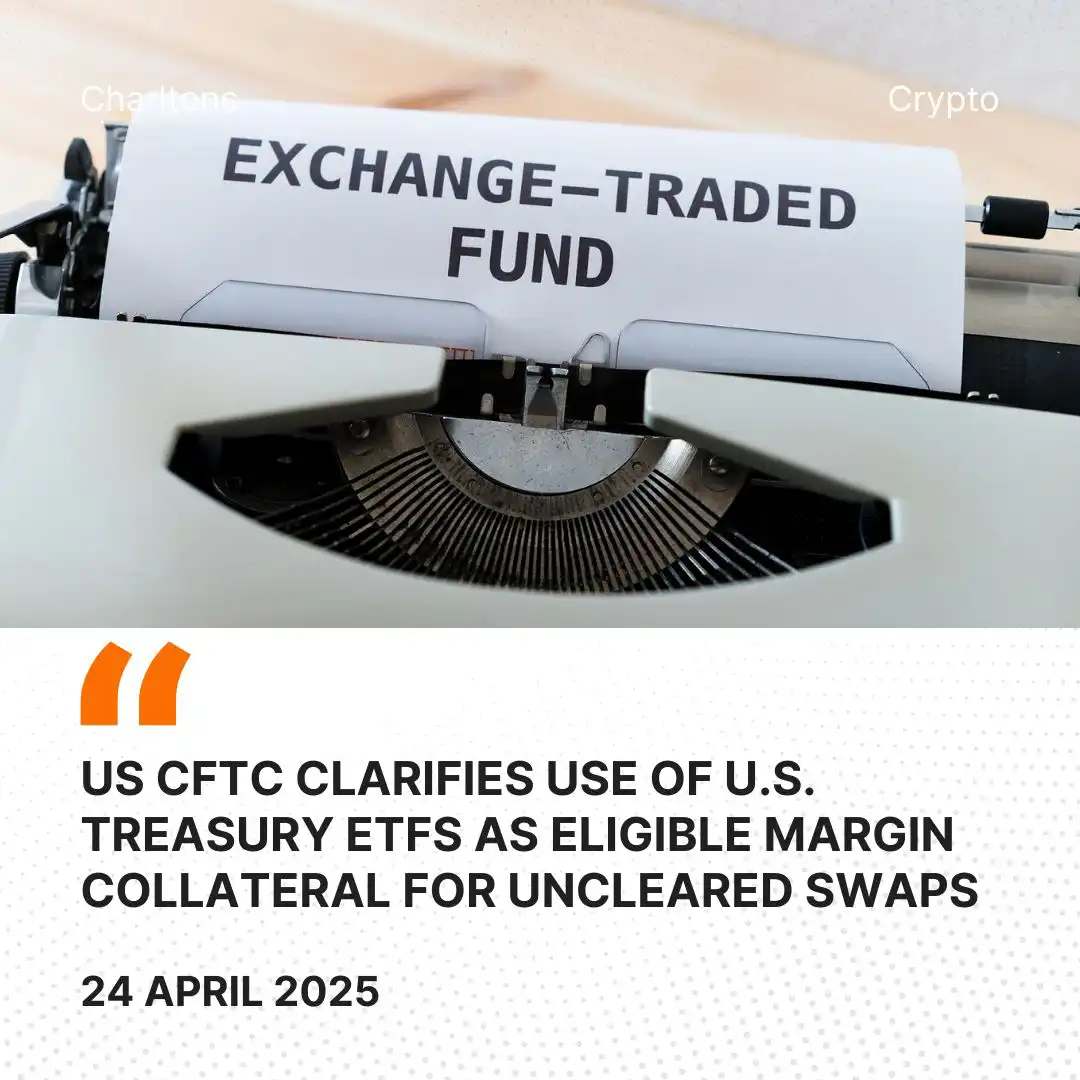
On 14 April 2025, the United States Commodity Futures Trading Commission (US CFTC), through its Market Participants Division, issued CFTC Letter No. 25-11 Staff Interpretation Regarding Exchange-Traded Funds as Eligible Margin Collateral for Uncleared Swaps Transactions to clarify that shares of certain U.S. Treasury exchange-traded funds may be deemed eligible margin collateral for uncleared swap transactions under the conditions prescribed by United States CFTC Regulation 23.156. This interpretative letter provides formal recognition that such ETF shares may qualify as both initial margin (IM) and variation margin (VM), reinforcing the liquidity and operational efficiency of the derivatives market.
The interpretative letter addresses a regulatory gap concerning the classification of redeemable securities in pooled investment funds. Pursuant to United States CFTC Regulation 23.156(a)(1)(ix), the rule permits certain redeemable securities issued by pooled investment funds—such as money market funds and similar instruments—to be posted as IM by covered swap entities (CSEs), which include swap dealers (SDs) and major swap participants (MSPs). The interpretation confirms that US Treasury ETFs structured as open-end investment companies under United States SEC Rule 6c-11 of the United States Investment Company Act of 1940 satisfy the conditions to be recognised as redeemable securities, thus qualifying as eligible collateral for uncleared swaps.
The clarification comes in response to a recommendation issued on 06 March 2024 by the Global Markets Advisory Committee (GMAC) of the US CFTC. The GMAC’s Global Market Structure Subcommittee in the recommendation stated that US Treasury ETFs offer portfolio diversification, transparent pricing, and superior secondary market liquidity compared to individual bonds. The recommendation emphasised that enabling such ETFs as margin collateral would enhance operational flexibility, reduce idiosyncratic risk, and increase collateral management efficiency for market participants.
Under United States CFTC Regulation 23.156(b), US Treasury ETF shares that qualify as eligible initial margin may also be posted as VM when transacting with financial end users. The interpretation specifies that to be considered eligible, such funds must: (i) be limited to U.S. Treasury securities and cash; (ii) issue and redeem shares daily based on market value; and (iii) refrain from securities lending or similar asset transfer mechanisms. These requirements ensure the collateral’s liquidity and stability under financial stress conditions, as originally intended by the CFTC Margin Rule promulgated in 2016.
US Treasury ETFs falling within the scope of United States SEC Rule 6c-11 are recognised as “redeemable securities” under the Investment Company Act of 1940. The US CFTC aligns with this classification and applies it to determine eligibility under its own margin framework. As the Division noted, the combination of primary and secondary market liquidity mechanisms, such as creation/redemption processes and arbitrage opportunities, supports the inclusion of such ETFs in the eligible collateral pool for uncleared swaps.
Regarding applicable haircuts, United States CFTC Regulation 23.156(a)(3) requires haircut percentages to be applied to account for potential declines in the value of non-cash collateral. For US Treasury ETFs, swap entities may choose either a weighted average discount based on underlying asset composition or a conservative fixed haircut based on the longest residual maturity of held assets. This aligns with the haircut methodology in the Prudential Regulators Margin Rule.
This interpretative guidance, while representing the view of the US CFTC’s Market Participants Division, is not binding on the Commission and it aims only to promote regulatory certainty, expand collateral flexibility for swap dealers and market participants, and enhance systemic resilience through prudent risk management of uncleared derivatives transactions. For further information or specific queries, the US CFTC has directed market participants to contact Associate Director Liliya Bozhanova or Attorney Advisor Christine McKeveny.
(Source: https://www.cftc.gov/PressRoom/PressReleases/9065-25)





